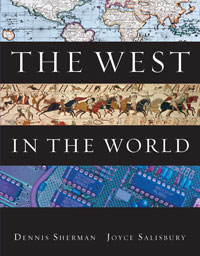 
The West in the World, 4th Edition (Sherman)Chapter 25:
Superpower Struggles and Global TransformationsCritical Thinking Questions- From Peace to Cold War
- How did the United States, Great Britain, and the Soviet Union disagree over the post-war fate of Eastern Europe?
- Why did tensions between the Soviet Union and Great Britain and the United States increase after the war ended? To what extent had there always been tension in the relationship?
- How did the Western powers react to the Soviet blockade of Berlin?
- Describe American foreign policy in the immediate post-war period.
- How was the Cold War "fought"?
- How did Cold War rivalries play out in Asia—in particular, in China, Korea, and Vietnam?
- How did the Cold War unfold in Latin America?
- What threat did a Communist regime in Cuba pose to the United States?
- East and West: Two Paths to Recovery in Europe
- Describe the two different political and economic paths to recovery adopted in the Soviet Union and Eastern Europe and in Western Europe.
- In the years after Stalin died, how was discontent expressed in Poland, Hungary, and Czechoslovakia and how did the Soviet Union respond to this discontent?
- Explain the ideas and policies behind the concept of the welfare state. Where did this system take hold?
- What early moves were made in Western Europe toward European economic and political integration?
- Discuss the advantages and disadvantages to the Communist systems in Eastern bloc nations.
- What kind of economic situation did Western European government spending and welfare-state programs produce?
- The Twilight of Colonialism
- What methods were used to achieve independence in the national liberation struggles of Southern Asia?
- Explain the roots of the conflict over Palestine in the Middle East.
- How did European colonies in Africa gain their independence?
- What problems did former colonies experience after gaining independence?
- A Sense of Relativity in Thought and Culture
- How did existentialists interpret reality?
- Describe post-war cultural trends in art and literature. Why did their themes and methods often bewilder audiences?
- Why did Europeans fear "Americanization"?
- Protests, Problems, and New Politics: The 1960s to the 1980s
- What victories did the Civil Rights Movement gain for African-Americans?
- What did student activists protest and attempt to achieve?
- Why was feminism revived in the Women's Liberation Movement of the 1960s? What demands did women make? What did they gain?
- How did rising world oil prices upset Western, Asian, and African economies?
- How did economic crisis and rising unemployment affect Western societies and, in turn, those people wanting to emigrate to Western nations?
- To what extent did politics turn left in Western Europe during the1970s and 1980s?
- What changes did the conservative politics of Thatcher and Reagan bring to Britain and the United States?
- Where was terrorism utilized as a form of protest?
- Post-Industrial Society
- What are the economic and social characteristics of a "post-industrial" society?
- How did daily life change in post-industrial society? What demographic changes characterized post-industrial society?
- How did family life and the process of raising children change?
- What was different about youth culture during this period?
- Breakthroughs in Science
- What was "big science"? To what breakthroughs in technology did "big science" contribute and how did this change the way people lived?
- What medical breakthroughs were achieved in the post-WWII period?
 |  |
|





